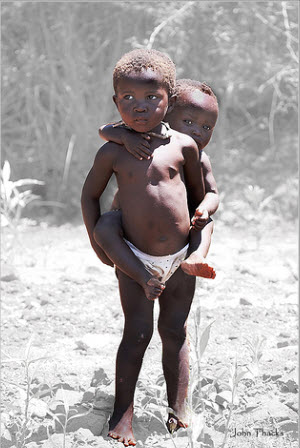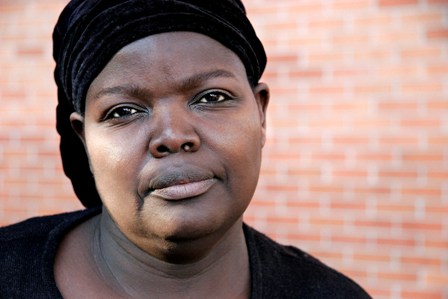Educating One Child: The Multiplication Effect!
 “He ain’t heavy, he’s my brother.” An African expression referring to responsibility for one’s younger siblings is, “I’m carrying them all on my back.” Educating the eldest child in a family, can result in the younger siblings also having the chance to go to school. Picture by John Thacks. When we educate one Kenyan child, we are often investing in the education of the whole family! How is this possible?
“He ain’t heavy, he’s my brother.” An African expression referring to responsibility for one’s younger siblings is, “I’m carrying them all on my back.” Educating the eldest child in a family, can result in the younger siblings also having the chance to go to school. Picture by John Thacks. When we educate one Kenyan child, we are often investing in the education of the whole family! How is this possible?
There is a Kenyan expression that an older sibling might use for his or her younger siblings: “I’m carrying them all on my back.” This is a metaphor for the strong sense of family responsibility for one another.
Here is one boy’s story:
Alex was ten years old when his mother died. His father was crippled and bedridden, unable to care for him. He and his four younger brothers were cared for by one of his mother’s friends. She was able to keep them all in Primary School, but when Alex was ready to go to High School, she was not able to afford the fees.
Eleven years ago, Leonora and Andrew Obara started to pay for Alex’s school fees. Two years later he came to live with them. He completed his schooling, received training as a truck driver and was fortunate to secure a job with a local casino, where he could use his driving skills. It is much credit to him that he landed this job, since it is evidence of his complete trustworthiness!
Alex, 24 years old, now works with a taxi company. This enables him to support his younger siblings, to feed them and to pay for their schooling.
 Through a scholarship, Leonora Obara was educated in social work, and has paid for her nine siblings to receive further educationThis Kenyan sense of responsibility to care for one another is very strong. Leonora Obara, one of the founders of Kijiji cha Upendo, is herself an example of this.
Through a scholarship, Leonora Obara was educated in social work, and has paid for her nine siblings to receive further educationThis Kenyan sense of responsibility to care for one another is very strong. Leonora Obara, one of the founders of Kijiji cha Upendo, is herself an example of this.
Growing up in a very poor family, she and her younger siblings could not go to school. Through Leonora’s resourcefulness and ingenuity this changed! She was eleven years old when her mother sent her to market to buy some vegetables. Leonora, however, came home with bananas. “We’re a poor family”, her mother scolded, ‘We can’t afford fruit!” So Leonora went back to the market place, set up her own stall, sold the bananas, one by one, making a profit. With that money she bought the vegetables, gave her mother some of the profits and taught her mother how to do the same. Their banana stall enabled all the children in the family to go to school!
Further education was yet another challenge. Leonora longed to be a teacher, but there was no money for Teacher’s Training College. Instead she volunteered her time teaching at a school run by a Dutch foundation. There she met someone who changed her life. A woman connected with the foundation suggested that Leonora apply to that foundation for a scholarship. Noticing Leonora’s gentle care for the poverty stricken children attending the school, she suggested that Leonora study to be a social worker, since she appeared to be gifted in that direction.
Leonora took her advice. The rest is history. Once Leonora graduated, she put her nine younger siblings through university. It has always been her joy and mission in life to see that children receive an education, including the fifteen that she and Andrew have raised!
Now she advocates for the children in Village of Love, that they too may receive an education.
